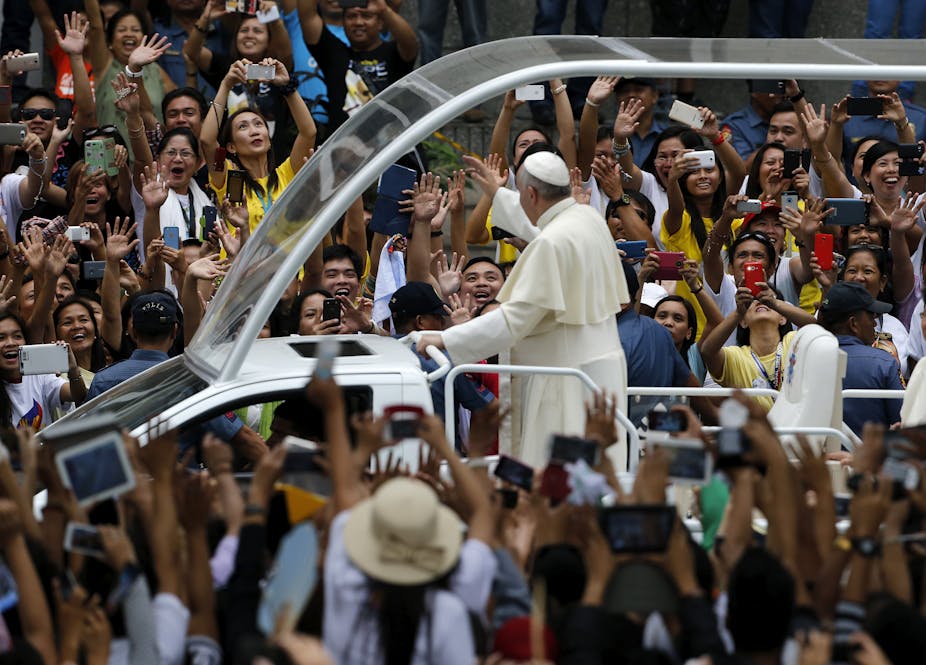Approaching his third year as head of the Roman Catholic Church, Pope Francis appeared to be doing so well. That is, until after the Charlie Hebdo massacre, he’s said that those who mock faith should be punched in the face.
This is the voice of authoritarian clericalism, and so jarring coming from Francis, who had staked out a claim to being inclusive and pluralist in the way that he conceived his religious ministry.
A pope from Latin America, a continent for long menaced by right-wing and now left-wing undemocratic rule, it was no surprise that he singled out free speech as a fundamental human right when he defined his papacy. He claimed in 2013 that Catholics had a duty to speak their mind in the public arena and so contribute to social progress.
But on January 15, en route to the Philippines, he indicated that free speech required restrictions. And it’s not just advocating violence that was off–limits:
Every religion has its dignity, One cannot provoke, one cannot insult other people’s faith, one cannot make fun of faith.
Suddenly, the religious leader whom Time Magazine had named as its Man of the Year in 2013 seems to have gone from being a modern and emancipatory figure to a medieval and small-minded one. Faiths should not deserve more consideration than the British monarchy, the capitalist system or Kim Jong-Un. Belief systems should seek respect through their conduct and the values that they seek to uphold.
Eye for a word
The pope may be infallible in matters of church doctrine. But he is not above criticism from within when he seeks to interpret it. Nor would it be good for the long-term health of their church for Catholics to throw a protective cordon around him if he goes badly astray as he appears to have done here.
Faiths reveal their fragility if they cannot cope with satire or humour. Only with the greatest difficulty did the Church, over the centuries, accept the right of satirists and comedians to challenge conventions. As far back as the 13th century, Dante described the different circles of hell in which numerous church figures could be found, popes among them, in his epic work The Divine Comedy.
Perhaps some allowance needs to be made for jet lag on a gruelling pastoral tour in Asia. I’m not sure though – the most dispiriting point in Francis’s conversation with journalists came when he said, referring to the organiser of his papal trips:
If my good friend Dr. Gasparri says a curse word against my mother, he can expect a punch. It’s normal. It’s normal …
So here we have the pope suggesting that a verbal provocation deserves a violent rejoinder. This may have been (or perhaps still even is) a normal perception in the honour-based society from which the pope springs. But it is anachronistic in most of the world, where vigorous debate has customarily been seen as the foundation of liberty.
Love your enemies
Last Saturday evening in a church in central Edinburgh, I listened to a sermon in which the priest vigorously disassociated himself from “Je suis Charlie”-style solidarity. He described Charlie Hebdo as a “scurillous” magazine, one that was deliberately provocative, wounding choice targets for pleasure.
He didn’t say that the slain media folk had it coming, but I wondered if it was really necessary after what went before. Nor did he ask for prayers to be said for the victims but for “the dead” in Paris. Neither did the pope appear to have the non-cartoonist victims in mind – the police, the hostages at the Jewish supermarket – when he made so much of the indignity of being given offence.
Francis seems to have momentarily forgotten some of the key teachings of Christ that set Christianity apart, such as: “Love your enemies, do good to those who hate you, bless those who curse you, pray for those who abuse you”.
Instead, he risks acting as a shop steward for religion in general, demanding that it enjoy special privileges from the secular authorities which it’s conduct doesn’t seem to warrant. Christian clerics facing declining congregations and seeking continued status in the eyes of the state may well be tempted to agree with the demands of dogmatic Muslims for censorship of speech concerning religion. If so, it means that a comedian such as the late Dave Allen or a film such as the Life of Brian may be viewed by historians of the future as products of a temporary era in human self-expression.
The pope finds himself in a perilous position in his claim that protecting faith is more important than other people’s freedoms. I’m sure that a golden bridge will be found that enables him to backtrack. But if not (and speaking as a Catholic) I would expect the British ambassador to the Vatican to deliver a note from the British government reminding the pope that in this murderous age, he has no place making remarks that could be seen as excusing unholy warfare.

